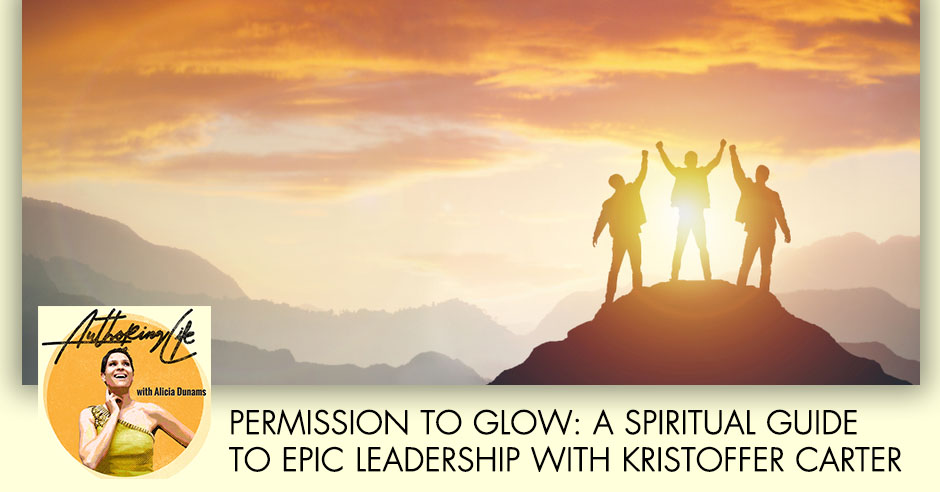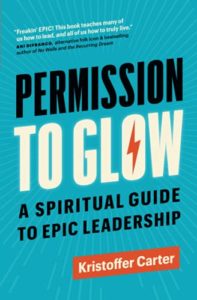
To bring light and peace to other people’s lives and transform them could be one of the greatest gifts one could give. Join your host Alicia Dunams as she talks with Kristoffer Carter about a spiritual guide to an epic leadership. Kristoffer is a spiritual teacher at the intersection of consciousness and business. He is the founder of This Epic Life, a website and podcast devoted to conscious living, which has created a daily meditation practice for thousands. Rooted in yoga’s ancient science of union with spirit, Permission to Glow offers four paths from panic, to peace, to power. Tune into this episode to dig deeper on what’s holding you back and give us insights on the four permissions.
—
Listen to the podcast here
Permission To Glow: A Spiritual Guide To Epic Leadership With Kristoffer Carter
A Spiritual Guide To Epic Leadership
I’m with another episode of the show. I’m very excited to introduce our next guest, Kristoffer Carter, a spiritual teacher at the intersection of consciousness and business. He is the Founder of This Epic Life, which is a website and show devoted to conscious living, which he has created a daily meditation practice for thousands of people.
He’s also an executive coach with clients such as Amazon, AT&T, startups, midsize and multi-generational family businesses. He has been on stage at TEDx, Wisdom 2.0, and countless other events. His new book is Permission to Glow. You are a student of Yogananda through the self-realization fellowship. We are going to be talking about these intersections. Before we get started, I would love to start with the first question. Why did you write a book?
First of all, thanks for having me. It’s an honor to be with you. I would say the why comes in many forms when you are a small business owner. One of my friends said it best. He’s like, “My business had a book-shaped hole in it.” I thought, for business reasons, I wanted to have my coaching work be as accessible to as many people as possible.
In my line of work in coaching, as we were talking about before this interview, it can be very privileged work. Not everybody can afford or have access to a high-level coach. I wanted to demystify leadership and coaching leaders so that there was that big why but the other part was that I had been an artist since I was a kid. I have always been a writer. I have a pretty diligent, devoted writing practice, and I wanted to put my craft into one place or put all my chips in behind one piece of work, so I have been excited about the journey.
I have been helping people write books for many years now, and one of the things about writing a book is you get your framework, methodology, lasting legacy, and what you want to teach people into a book. It’s something that people can carry with them. I know people refer to it as a business card or a way to get on TV. What is your legacy? What are you leaving behind? As you mentioned, how can you support people in getting access to this knowledge, and how have you been supporting business leaders for years?
You nailed it. I have three kids. You always wonder with these morbid thoughts like, “What if I walk off the Earth tomorrow? Will they have enough for me to keep going and do what they are here to do in the world?” I did pump a lot of that into the book. Any wisdom I have gleaned, practices, and methodology, it’s all right there. There are four permissions, which are the central framework of the book. Basically, I was saying, “If you do nothing else other than practice these things, you will be more than okay.”

I wanted to learn from you. What are some of the biggest life lessons or leadership lessons that you want to share with our audience in the book? You talk about the four universal and common lessons that you have spoken to.
I call them the four permissions, and these are permissions that we have to give ourselves. It’s not my job to give anybody else permission that barely works with my own kids anymore but I can inspire people through coaching to give themselves this permission. When we do that, we step up and claim our agency and power.
Permission To Chill
It starts with Permission to Chill, which is to slow down and to be with what is to create a daily meditation practice, ideally, and in strengthening that muscle of our meta-attention, it keeps us in line with our dreams and goals. It also helps us not be so freaking reactive to this crazy world around us where we step in and say things that we don’t mean that incites people, but rather to be more thoughtful. That’s all under that first permission, which is Permission to Chill.
Permission To Feel
From there, it goes into Permission to Feel the Feels, which is to embrace our full humanity and listen to the wisdom and the counsel of our feelings, and that sets us up for permission three, which is Permission to Glow in the Dark. It’s where the title of the book comes from, which is the reason we hire a coach in the first place is to fully self-actualize ideally with witnesses to be that person that’s like, “They are doing their damn thing. That’s incredible.”
Permission Of Collaboration
What I have found is that we cannot take on that work or the audacity that it takes to be us in the world. If we are not willing to do those earlier permissions of getting calm, quiet, listening to the wisdom our bodies are speaking to us through the emotions, then we have a shot at glowing in the dark. Finally, the fourth permission, Permission to Glow in the Light. It’s to transcend all of this competition and scarcity, to transcend all what-about-me stuff for the what-about-us for the good of the collective. That’s where a lot of your work lies as well, which is inspiring. It’s unlocking that fourth permission of collaboration.
I love those four permissions. Before we’ve got on the call, I was sharing how I have taught over 100 unconscious bias leadership training over the last few years. I created a framework called The Slippery Slope versus The Conscious Climb, and as we are on the conscious climb. It’s this climb from being self-centric to other-centric. It is leaving the eye or the ego behind and walking towards the we collective, as you mentioned.
My particular framework is utilizing communication scripts, and one of the communications scripts that I use is what we can do to solve the said problem because when we do, we will benefit. What can we do to ensure we have an inclusive environment? When we do, we will ensure that everyone feels seen, heard, and understood.
When we do the four permissions, we step up and claim our power.
Instead of it coming from me against you and us against them, which is again, this self-preservation that our ego is in our critter brain, what does it look like to be in this we collective. I want you to speak about this. It requires shutting down the part of us that is reactive, ego-based or fear-based. It requires us to do emotional intelligence work. We can’t jump that step, so my question for you and your book is, how do you support people in these permissions to get to that place of we?
There is so much common ground here as you are speaking. In the book, I make this joke about us having this overcorrection in our culture around I’ve got this. When we say, “You’ve got this, girl. You’ve got this. I’ve got this,” it implies confidence but that overcorrection of confidence hardens into this self-protection thing where it protects us from engaging with the collective. There’s no comparison between the limited potential of I’ve got this, and the unlimited potential of we’ve got this.
One of the goals of the book is to coach people from the safe haven of I’ve got this back into the we’ve got this. To answer the question, there’s something that I call the frenemies. These are the frenemies within that that are there to protect us but they stop us short of getting us to the goal of these permissions. We all know that we probably make better decisions when we slow down and think things through but we have this frenemy inside us called Speedy Rabbit.
Speedy Rabbit likes to get there first and likes to buy everybody coffee on the way. You can usually recognize them by sweating out in their pants suit. They are like this amped-up frenetic fast-moving speed freak, and that’s our culture spooking us into moving too fast. Getting conscious of that first one is key, like, “I’m being a Speedy Rabbit here. I should give myself permission to chill and slow down.” Each of these permissions has a corresponding frenemy.
There’s Game Face, which you probably run into a lot in your work. This is the leader that’s like, “There’s nothing to see here. There are no weeds in my garden. Everything is fine. Don’t ask.” What are you protecting here? When we have that flat, neutral smile of everything is fine, it protects us from letting people act into what’s going on with us or not letting them into our vulnerability and sharing our heart.
Probably the most common one I coach in leaders is the frenemy of Permission to Glow in the Dark, which is what I call the Phantom Pest. This is the leader who gets spooked because they can’t control anything. They can’t control a global pandemic, for example, but they can micromanage everybody around them and drive them all crazy.

That’s the swooping and controlling thing that we do when we are confronted with our own power because it’s much less convenient to step into our own power and to do the big, bold thing than it is to micromanage things like PowerPoint fonts or something that doesn’t mean a lot. Step one is to get aware of the frenemy that’s in play, cop to it, and then work with it. Don’t just judge it as bad but say, “I’m doing the thing that we do,” and then other options become available.
I want everyone at home to know that you can purchase the book on Amazon. It’s called Permission to Glow: A Spiritual Guide to Epic Leadership. I want to support Kristoffer in this fantastic book. What are some other lessons that you want to share with the audience that you share in your book about leadership in life?
I would say that early on in the book, I talk about that the purpose in all of this, believe it or not, is peace. We crave any sense of peace in our careers and our lives. If you think about it in terms of your career, it’s not just about making more dollar bills and having big job titles, although those things are important. What we are craving is a sense of meaning and purpose that is directly tied to peace. This is where our career gets elevated into a vocation knowing that we are getting paid to do the thing that we are here to do or to be the person we are here to express, and that has a lot more vastness and spaciousness to it versus the whole push for what’s next constantly.
I make a big case at the beginning of the book for why the whole purpose is peace, and then later on after we present the permissions and I try to encourage people, give them the tools and practices, we wrap it up with the Seven Compassionate Laws of Personal Change. I grew up on 1980s personal development stuff. I loved all of it.
I have walked on hot coals with Tony Robbins. It was awesome. I have read 7 Habits I don’t know how many times. I love Stephen Covey. They were all these forefathers of modern personal development but I feel like we were stopped short. It was so achiever-based that we didn’t have any self-compassion along the way.
We didn’t learn that we have to love ourselves through this process of growth. The leaders I work with that are willing to give themselves some self-compassion as we go through this allow themselves to be wrong. Before I’ve got into coaching, I was very brittle. If somebody like you gave me feedback in an inclusion workshop, I would think like, “I have been messing this up forever.”
I felt very brittle, and you probably run into that a lot. We don’t allow ourselves to be wrong, whereas the conscious leader who makes space for that and says, “I have room for growth here,” even that has a degree of self-compassion that becomes this grease in the gears that allows us to change. I make a big case at the end to infuse a little bit more of self-compassion, and even being alive in this day and age is hard enough. Let alone being on a path of growth, so you might as well love yourself along the way.
There are bigger thoughts and bigger opportunities that aren’t accessible to us when we are stuck in survival mode.
Self-compassion is so important. I love that you bring that up. I want to ask you a question, particularly regarding your book. What are the common pitfalls of leaders, and how do we get triggered by survival mode? You were speaking about survival mode before.
It’s all around us, and it’s gaining complexity and intensity every single day. The military calls this a VUCA. Whatever we are living through now has a name, which is a good thing. VUCA stands for Volatility, Uncertainty, Complexity, and Ambiguity, and it shows up every day in new ways. That’s what triggers us when we are unconscious, not fully slept, fully meditated or on our A-game, and not dialed or connected into ourselves. We will get spooked into moving too fast, as I mentioned with speedy rabbit and protecting our hearts like game face. That’s the common thing.
It’s not a question if the world is going to pull us around by the hair a little bit. We live in a crazy world at this moment, and we live at a time of unlimited possibilities, so when we are more conscious of how we react to it, we stay a little bit more out of that survival mode and into those higher faculties of, “What do I want to create? How do I want to treat people? How do we all collectively exceed our goals together?” These are bigger thoughts and opportunities that aren’t accessible to us when we are stuck in survival mode.
That’s so powerful. I was sharing with you that I’m writing my book now, and I have a whole section around reflective questions because one thing that reflective questions do is slow us down. We want these self-regulation tools to support us from our critter reactionary brain into our prefrontal cortex, our abundant, collaborative or slow brain. When reflective questions support us in that, and I love how you brought up a few reflective questions like, “Who do I choose to be at this time?” that is truly important. Another question that I have for you is what are the common ways we can regain perspective and shift back into our power zones?
I love the quote that is misattributed to Viktor Frankl. It seems like it probably came from Stephen Covey longer ago. You may have heard it. It’s between stimulus and response, there is a space, and that space is our ability to choose our response, and our response lies in our growth and freedom. It’s something I have really tried to live by as a meditation practitioner and then teacher. If we widen that gap between stimulus and response, choices become available to us, and that is where we have the opportunity for intervention.
The common one I bring up all the time with myself is that if I’m washing dishes to be able to get food on the table for dinner, I’m in between work running my own business, feeding kids, the dogs nipping at my heels to be fed, the kids are nipping at my heels and fighting with each other, and I want to blow my stack. I’m over it.

At that moment, the practice is I try to get more mindful of the warmth of the water on my hands. I start slowing down my experience of this moment and realize that I’m in the same loop that I have probably been in for years at this time of day. It’s part of my cycle like everybody has some sort of mood cycle. In doing so, I get to more thoughtfully respond to whichever child needs something versus maybe what my dad trained me to do, which was to fly off the handle or say something I will regret. It’s that conscious moment we give ourselves to make a difference.
I would encourage leaders to do 4-7-8 Breathing. It’s a great tool. Breathe in through the nose for a count of 4, hold it for 7 counts, then out through the mouth for a count of eight. If you do four counts of this, it takes 57 seconds. It’s in through the nose for a count of 4, hold for 7, and exhale for a count of 8. That 57 seconds can reboot you in any number of ways. You are taking specific rhythms and enforcing them on the involuntary nervous system. The part of us that wants to run amock, rampage, and be scared, you are forcing it to slow down. You are coddling it like a baby. In doing so, you are more likely to respond in a way that helps everybody after that.
Thank you for the tool. It’s a great self-regulation tool for everyone at home. I want to jump into our lightning round to ask you some questions. You have already answered the first thing that comes to mind talking about using different parts of the brain here. With that, what is your legacy going to be?
The net is how people remember us but I hope my legacy is being somebody who lived on purpose, and my purpose happens to be to bring light and peace to the hard work of personal transformation. Any of my clients that gather to talk about me, get together or hopefully, how my kids remember me is somewhere in there.
What is your favorite book?
Bar none, Autobiography of a Yogi by Paramhansa Yogananda. It’s a book that people told me to read for about eight years, and once I finally read it, I haven’t stopped reading it. Steve Jobs read it 50 something times before the end of his life. He gave it to everybody at his funeral. It’s had a profound impact on me.
One thing that reflective questions do is slow us down.
I didn’t know that he gave it to everyone at his funeral.
It was wrapped in nondescript brown wrapping. There is this video of Marc Benioff, the Founder of Salesforce, talking about going to that funeral and receiving this mysterious package, and it was that book. When Steve passed away, it was the only book on his iPad. It hits different every time you pick it up.
I’m going to get that. Who’s your favorite author?
As so many of my author heroes have become friends, I would want to do a rotating hot seat of my friends that have written books that have changed my life. Jonathan Fields is a big mentor of mine. He is a great author. He had a great book that came out this 2021 called Sparked. It’s about finding meaning in your work. I would put him up there as well as my good friend, Susan Piver, who has written some profound books on meditation and Buddhist teachings.
What are you reading next? What’s on your book stack?
The stack has gotten large. I don’t know about you but when I’m writing, I try to manage my inputs, so if I’m focusing on my output, I don’t want to have too many inputs of comparison or other conflicting ideas. I have had a stack of a lot of good friends’ books pile up over the past few months. My friend Jeffrey Davis’ book, Tracking Wonder. I’m also excited to read my friend Pam Slim’s book, The Widest Net. All these friends and authors have had a big impact on me and have been champions of my book, so the least I could do now is to go finally catch up on some good reading.
My final question is, what are you writing next?
The big honking dream on my end is to write a book for each of the four permissions and to make this a five-set series, so I will be starting on the Permission to Chill book here pretty soon.

What would you want to leave our audience at home? What’s one piece of advice or leadership lesson that you have in your book that you want to leave with our audience?
Under the topic of authorizing, what I learned through this process is that there is no braver, courageous or noble work other than having the audacity to sit down and create something that hasn’t existed before. It deserves to be hard. It’s okay to be hard, and from that time you put into it, magic is generated. It will happen. I had to write 80,000 words to get to the 29,000 that my editor loved. Every minute that it took to do that was worth it.
There is a quote. I don’t know who said it, “At a time of destruction, create something.” It is such a creative process to sit down, write a book, and bring your ideas together. I’m in the process now, so I’m enjoying it. I’m consuming a lot of books as I write my book because it inspires me. I always invite all my clients that when you are writing your book, you get to read books because it will inspire or spark something in you. This is fantastic. I would love to hear how we can find out more about you or where people can find you on social media and purchase your book.
Thanks for asking. Mostly, I can be found at ThisEpicLife.com. That’s my coaching and training practice. My book is www.PermissionToGlowBook.com. It’s available everywhere online, and you can find me pretty much anywhere on social media, @ThisEpicLife.
It has been so wonderful to interview you with Permission to Glow. I love that. We all have the permission to glow. With that, I want to thank you and everyone for being here. I will see you next time on the next episode of the show.
Thanks so much for having me.
Important Links:
- This Epic Life
- Permission to Glow
- Permission to Glow: A Spiritual Guide to Epic Leadership – Amazon
- 7 Habits
- Autobiography of a Yogi
- Salesforce
- Sparked
- Tracking Wonder
- The Widest Net
- @ThisEpicLife – Twitter
- www.Facebook.com/thisepiclifeofficial
- www.LinkedIn.com/in/kristoffercarter
- www.Instagram.com/permissiontoglowbook
About Kristoffer Carter
 KRISTOFFER CARTER (“KC”) is a spiritual teacher at the intersection of consciousness and business. He is the founder of This Epic Life, a website and podcast devoted to conscious living, which has created a daily meditation practice for thousands. As a meditation teacher and workshop designer, KC has 6,500 active students on Insight Timer, with 120K streams.
KRISTOFFER CARTER (“KC”) is a spiritual teacher at the intersection of consciousness and business. He is the founder of This Epic Life, a website and podcast devoted to conscious living, which has created a daily meditation practice for thousands. As a meditation teacher and workshop designer, KC has 6,500 active students on Insight Timer, with 120K streams.
As an executive coach, Carter works with leaders at Amazon, AT&T, Avery-Dennison, and many start-ups and mid-sized multi-generational family businesses. He is also an accomplished international speaker, emcee, and retreat leader whose work has appeared in Business Insider, onstage at TEDx and Wisdom 2.0, and in countless other events. Permission to Glow is his first book.
Carter is a disciple of the teachings of Paramahansa Yogananda, through Self-Realization Fellowship, and their lineage of masters. Touring as a multi-instrumentalist and songwriter in his teens, he continues to write songs and produce his teenage daughter’s band. He lives in Akron, OH with his wife of twenty-two years and their three children.
For more information, please visit:
Website: www.thisepiclife.com
Facebook: www.facebook.com/thisepiclifeofficial
Twitter: twitter.com/thisepiclife
LinkedIn: www.linkedin.com/in/kristoffercarter
Instagram: www.instagram.com/permissiontoglowbook
